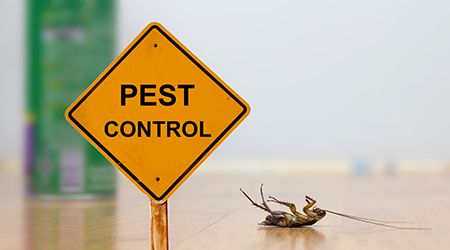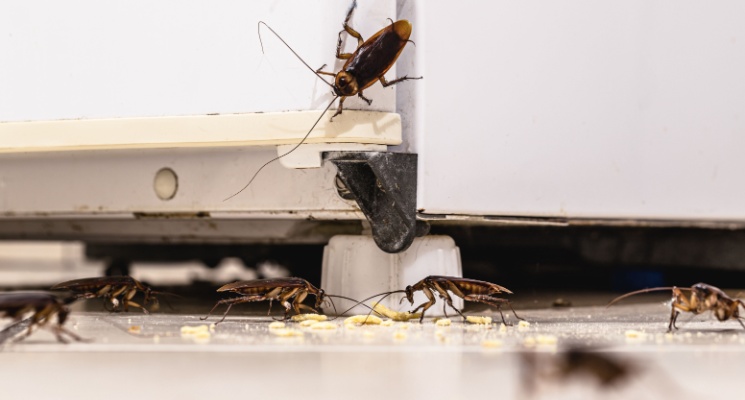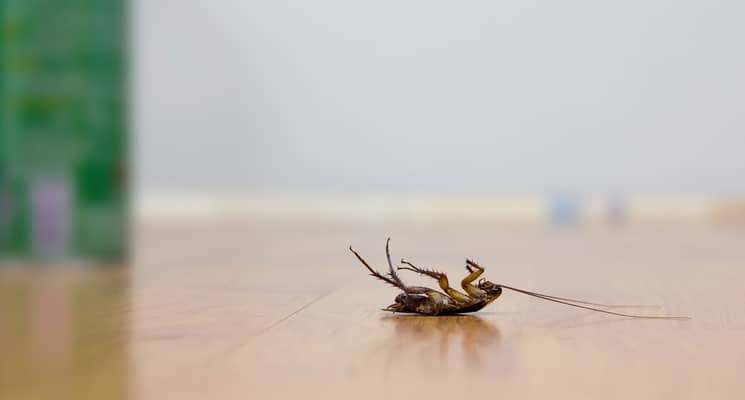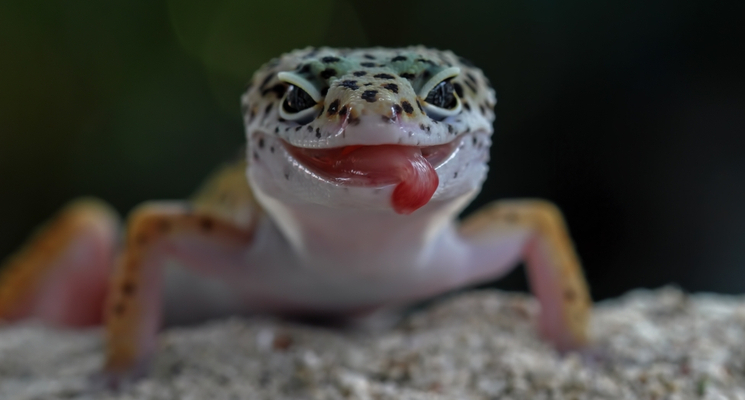In Dubai, pest control is a pressing issue for homeowners, with various pests infiltrating residences. Understanding which pest is most prevalent is crucial for effective management. This helps you prioritize the infestations that require an immediate pest control service in Dubai. Read on to uncover the common intruders found in most homes and learn how to keep them at bay.
Understanding the Pest Landscape in Dubai
Dubai’s unique climate, characterized by hot summers and mild winters, provides an ideal environment for various pests to thrive. From ants and spiders to rodents and bed bugs, homeowners in Dubai encounter a diverse range of pests. ServiceMarket recently analyzed the pest control requests received over July 2023–February 2024 to determine which pest is the most prevalent in Dubai homes right now. It concludes that one pest reigns supreme in terms of prevalence and adaptability – the cockroach.
| Type of Pest | Percentage of Prevalence |
| Ants | 10% |
| Bed Bugs | 7% |
| Cockroaches | 57% |
| General Pest Control | 26% |
Cockroach Infestation
When it comes to unwelcome guests in homes, cockroaches undoubtedly top the list. These creatures thrive in warm and humid environments, making Dubai’s climate ideal for their proliferation. Cockroaches are notorious for their ability to adapt and survive in various conditions, making them challenging to eradicate once they infest a home.
These pests are not only unsightly but also pose health risks to residents. Cockroaches can contaminate food and surfaces with pathogens, including bacteria such as Salmonella and E. coli, as well as parasitic worms, potentially causing food poisoning and allergic reactions. Additionally, their droppings and shed skin can trigger asthma and other respiratory issues, particularly in sensitive individuals.
To prevent and manage cockroach infestations, homeowners should maintain cleanliness and eliminate potential hiding spots. Regular cleaning of kitchen areas, sealing cracks and crevices, and proper food storage are essential measures to deter these pests. In severe cases, professional pest control services may be necessary to eradicate cockroach populations effectively.
Common Cockroach Species Found in Dubai
Two species of cockroaches are most commonly found in Dubai. These include the German cockroach (Blattella germanica) and the American cockroach (Periplaneta americana). The German cockroach is smaller in size, ranging from 1/2 to 5/8 inch in length, with a light brown coloration and two dark parallel stripes on its pronotum. On the other hand, the American cockroach is larger, measuring around 1 to 1.5 inches in length, reddish-brown in color, and characterized by a yellowish figure-eight pattern on its pronotum.
Factors Contributing to Cockroach Infestations
Several factors contribute to the prevalence of cockroaches in Dubai homes:
Climate
Dubai’s warm and humid climate provides an ideal breeding ground for cockroaches, allowing them to reproduce rapidly throughout the year.
Urbanization
Rapid urbanization and construction activities create disturbances in natural habitats, driving cockroaches to seek shelter in human dwellings.
Food Sources
Cockroaches are scavengers and can feed on a wide range of organic matter, including crumbs, grease, and even household waste. Improper food storage and hygiene practices can attract these pests into homes.
Shelter
Cockroaches like to hide and breed in cracks, crevices, and warm, damp places like kitchens and bathrooms.
Other Common Pests in Dubai
While cockroaches take the spotlight as the most prevalent pest in Dubai homes, they are not the sole invaders. Several other pests can wreak havoc on households, each presenting its own set of challenges.
Bed Bugs
Another common pest found in Dubai homes is the bed bug. These tiny, blood-sucking insects hide in crevices around beds and furniture, emerging at night to feed on human blood. Bed bug bites can cause discomfort, itching, and skin irritation, leading to sleep disturbances and stress for affected individuals.
Bed bugs are often introduced into homes through infested furniture, luggage, or clothing, making them a common nuisance in both residential and hospitality settings. Despite their small size, bed bugs can quickly multiply and spread, making it essential to address infestations promptly.
Effective bed bug management requires a combination of thorough cleaning, vacuuming, and targeted insecticide treatments. Washing bedding and clothing in hot water, vacuuming mattresses and furniture regularly, and sealing cracks and crevices can help prevent and control bed bug infestations. However, severe cases may necessitate professional pest control interventions to eliminate these persistent pests.
Ants
Ants are another prevalent pest found, often invading kitchens and pantries in search of food and water. These industrious insects form colonies with complex social structures, allowing them to forage for food efficiently and establish extensive networks within homes.
While most ants are harmless, some species, such as pharaoh ants, can transmit diseases and contaminate food supplies. Moreover, ant infestations can be particularly bothersome in food preparation areas, where they can contaminate surfaces and stored food items.
Preventing ant infestations requires maintaining cleanliness and eliminating food sources that attract these pests. Storing food in airtight containers and promptly cleaning up spills and crumbs can help deter ants from invading homes. Additionally, strategic placement of ant baits and barriers can be effective in controlling ant populations without resorting to harsh chemicals.
Termites
Termites pose a significant threat in homes, particularly those constructed with wood and other cellulose-based materials. These silent intruders can cause extensive damage to structures, often unnoticed until it is too late. Termites weaken the structural integrity of buildings, leading to costly repairs and compromises in safety.
Implementing termite barriers during construction, regular inspections, and treating infested areas with termite-specific pesticides are crucial for termite management.
Flies
Flies are a common sight especially during the warmer months. These flying insects are attracted to food, garbage, and organic matter, making kitchens and waste disposal areas prime targets for infestation.
While flies are primarily a nuisance pest, they can also pose health risks by spreading disease-causing pathogens. Houseflies, in particular, are known to carry bacteria and viruses that can contaminate food and surfaces, increasing the risk of foodborne illnesses.
To prevent fly infestations, homeowners should practice proper sanitation and waste management. Keeping garbage bins tightly sealed, cleaning up pet waste promptly, and covering food and drinks can help reduce fly attraction to homes. Installing screens on windows and doors can also prevent flies from entering indoor spaces, maintaining a hygienic environment for residents.
Rodents
Rodents such as rats and mice are unwelcome guests, capable of causing extensive damage and spreading diseases. These nocturnal pests can enter homes through small openings in search of food, water, and shelter, posing risks to both property and human health.
In addition to causing property damage by gnawing on wires, insulation, and furniture, rodents can also contaminate food supplies with their urine, droppings, and fur. Moreover, these pests are known carriers of various diseases, including leptospirosis, salmonellosis, and hantavirus, making rodent infestations a serious concern for homeowners.
Preventing rodent infestations requires sealing entry points, removing potential food sources, and implementing effective trapping and baiting strategies. Securing garbage bins, storing food in rodent-proof containers, and maintaining a clutter-free environment can deter rodents from taking up residence in homes. Additionally, regular inspections and proactive measures can help identify and address rodent infestations before they escalate into significant problems.
Prevention and Control Measures
Effective pest management relies on a combination of preventive measures and targeted interventions. Here are some practical steps residents can take to keep pests at bay:
Maintain Cleanliness
Regular cleaning, proper food storage, and waste disposal are essential for depriving pests of food and breeding grounds.
Reduce Moisture
Address any leaks or moisture issues in the home, as damp environments attract pests like cockroaches and rodents.
Trim Vegetation
Keep shrubs and trees trimmed away from the house to prevent ants and other pests from using them as bridges to enter the home.
Specialized Pest Control
In cases of severe infestation, seeking assistance from licensed pest control professionals is crucial. They can provide targeted treatments and ongoing monitoring to ensure long-term pest management.
General Pest Control Services
General pest control services in Dubai are designed to address common household pests such as ants, cockroaches, and rodents. These services typically involve a comprehensive inspection of the premises to identify pest infestations, followed by tailored treatment plans.
Professionals use a combination of chemical and non-chemical methods to eradicate pests while ensuring minimal disruption to the occupants. Regular follow-ups may be scheduled to monitor the effectiveness of the treatment and prevent re-infestations.
Termite Control
Termite control services aim to detect and eliminate termite colonies, protecting structures from structural damage. Professionals may employ various techniques such as soil treatment, baiting systems, and barrier methods to eradicate termites and prevent their return.
Bed Bug Extermination
These extermination services involve thorough inspections of bedding, furniture, and other potential hiding spots to locate and eliminate bed bug infestations. Professionals use heat treatment, chemical pesticides, or a combination of methods to eradicate bed bugs and their eggs effectively. Educating clients on preventive measures is also integral to preventing future infestations.
Mosquito Control
Services for mosquito control reduce mosquito populations in residential and commercial areas through targeted interventions. This may include larviciding, fogging, and habitat modification to eliminate breeding sites and disrupt the mosquito life cycle. In addition to chemical treatments, professionals advise on environmental management practices to minimize mosquito breeding grounds.
Rodent Control
Various methods are employed to prevent and eliminate rodent infestations, including baiting, trapping, and exclusion techniques. Professionals conduct thorough inspections to identify entry points and implement measures to seal off access points. Ongoing monitoring and maintenance are essential to prevent rodent re-infestations.
Fumigation Services
Fumigation is a specialized pest control technique used to eliminate pests in enclosed spaces such as warehouses, shipping containers, and food processing facilities. Fumigation services involve the application of gaseous pesticides to penetrate and eradicate pests hiding in inaccessible areas.
Professionals follow strict safety protocols to ensure the effective distribution of fumigants while minimizing risks to human health and the environment. Proper ventilation and clearance procedures are essential before the premises can be reoccupied.
Conclusion
In Dubai’s diverse urban landscape, homeowners face various challenges in maintaining pest-free homes. Understanding the common pests found and implementing effective prevention and management strategies is essential for safeguarding residents’ health and well-being. By adopting proactive measures, practicing proper sanitation, and seeking professional assistance when needed, homeowners can mitigate pest infestations and enjoy a clean and comfortable living environment.
If you ever feel the need to book pest control in Dubai, head over to the ServiceMarket website or app and experience high-quality, municipality approved treatments that are sure to bid farewell to the creepy crawlies.







